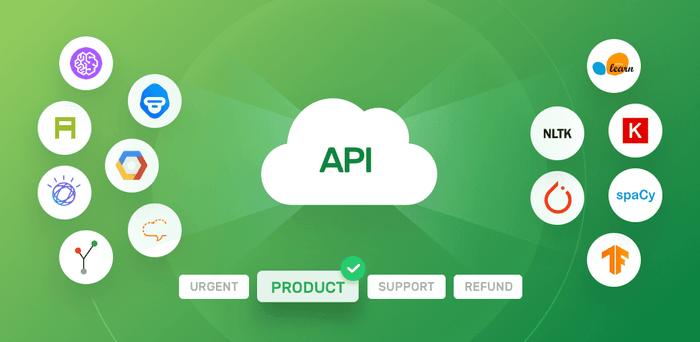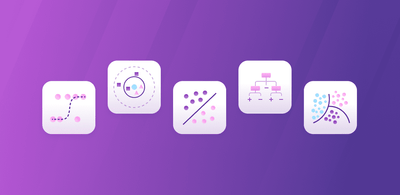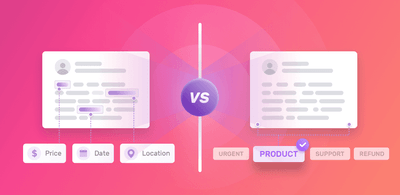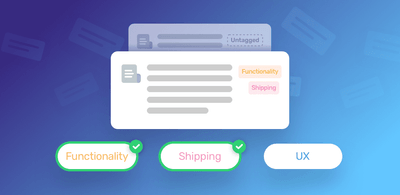Best Text Classification APIs – Automatically Organize Data

You can choose between open-source and SaaS text classification APIs to connect your unstructured text to AI tools. Open-source libraries can help developers build flexible and highly customized text classification models, but take time to set up.
SaaS APIs for text classification, on the other hand, are much easier and faster to implement, require fewer resources and less technical expertise.
Read on to discover some of the best open-source and SaaS APIs you can use to classify your text.
Best Text Classification APIs (SaaS & Open-Source)
Top SaaS APIs for Text Classification
Most of these tools offer trial versions or pre-trained models, so you can try them out to see if they fit your business model:
1. MonkeyLearn
MonkeyLearn is a user-friendly machine learning platform that lets you dive into text classification right away using pre-trained models. One of the most popular text classification models is the sentiment classifier, which you can connect through MonkeyLearn API right away.
You can also easily build custom text classifiers through MonkeyLearn for more accurate insights, and start detecting topics, sentiment, intent, and more. In just a few steps, you can define your tags, train your model using your own data, and connect it via the API with just a few lines of code.
2. Google Cloud NLP
Google Cloud NLP is a suite of text analysis tools to help you find insights in unstructured data.
Using the Natural Language API, you can connect to powerful pre-trained models, designed to deliver generic results with high accuracy for sentiment analysis and content classification. The content classification tool, for example, allows you to classify documents into more than 700 categories.
If you need a classification model tailored to a specific use case, you can use AutoML Natural Language, which allows you to build customized solutions using your own pre-defined categories.
3. Aylien
Aylien is an AI platform that offers different text analysis solutions for businesses. With the text classification API, you can automatically find topics in documents or websites.
The API applies two taxonomies: one that uses 500 categories to tag news and media content, and another that’s more focused on advertising and allows companies to display online ads in the right places.
4. IBM Watson
IBM Watson is a multi-cloud platform with an array of AI tools to classify business data. With the Natural Language Classifier, developers can build custom classification models to find topics in data. You can train a model in under 15 minutes (no machine learning background required) and easily integrate models into your applications using the API.
Watson also provides a pre-built solution for text analysis called Natural Language Understanding, that you can use to find sentiment, emotions, and categories in text.
5. Meaning Cloud
Meaning Cloud offers a collection of cloud-based APIs for text analysis. The text classification API comes with a series of predefined categories to automatically sort data (for example, you can classify news content into more than 1300 topics), or you can create custom models using your own categories.
The sentiment analysis API, on the other hand, helps you identify polarity and irony marks in text across different languages. Developers can customize this solution as well, defining their own dictionaries adapted to their domain.
6. Lexalytics
Lexalytics is a modular business intelligence platform, featuring different solutions for text analysis. The Semantria API allows you to perform document categorization and sentiment analysis using Natural Language Processing and machine learning.
The models support text in different languages and are highly customizable: you can easily train them to recognize industry-specific vocabulary and tweak different parameters to obtain better results.
7. Amazon Comprehend
Amazon Comprehend is an NLP service with an array of APIs you can easily integrate into your applications. You’ll find APIs for sentiment analysis, language detection, and a custom classification API, that can help you build text classification models adapted to your business needs. You don’t need any machine learning knowledge or extensive coding skills to create a custom model.
Top Open-Source Libraries for Text Classification
1. Scikit-learn
Scikit-learn is a user-friendly machine learning library for Python. Through its well-documented API, you can connect to different classification algorithms and build models for tasks like spam detection, image recognition, and topic classification.
It’s a great library for beginners, and performs well in most use cases.
2. Natural Language Toolkit (NLTK)
Boasting a large number of resources and algorithms, NLTK is one of the most famous Python libraries for text analysis, especially among researchers and students looking to get hands-on experience.
You’ll find several APIs that you can use for topic classification and sentiment analysis, as well as labeled datasets that you can use to train them. The major drawback about this library is that it doesn’t handle data at scale.
3. SpaCy
SpaCy is a Python library for NLP, praised for being fast and having industrial-strength capabilities.
It provides an easy-to-use API that allows you to create classification and sentiment analysis models, using state-of-the-art algorithms for each problem.
4. TensorFlow
TensorFlow is Google’s open-source platform for machine learning and has rapidly become the most popular library, used by companies like Twitter, AirBnb and Uber. With tools and resources that are constantly updated, you can start building powerful deep learning models as you learn.
With the Tensorflow API (available in different programming languages) you can build models to perform advanced text classification tasks.
5. PyTorch
PyTorch is an open-source machine learning framework based on the Torch library and developed by Facebook. Simple, flexible, and fast, it’s excellent for both developers and researchers who want to train deep learning models.
The PyTorch API makes it simple to create text classification models and offers different features to improve your model’s performance.
6. Keras
Keras is a powerful Python library designed to build deep learning models that can run on top of frameworks like TensorFlow, R, and Theano.
With a collection of easy-to-use and intuitive APIs (plus, extensive documentation), this library is a great place to get started with text classification and obtain great results.
Final Note
Text classification tools help you organize data by topic, sentiment, intent, and more. They allow you to automate time-consuming tasks ‒ like tagging incoming emails and routing customer support tickets ‒ and provide valuable insights into what customers think about your business.
Automating daily tasks with text classification is simpler than you think, thanks to open-source libraries and SaaS tools that are easily accessible through APIs.
With MonkeyLearn’s text classification API you can create a custom text classification model and integrate it into your own apps in just minutes. Ready to try it out? Sign up to MonkeyLearn and start classifying your data right away.

Tobias Geisler Mesevage
May 28th, 2020





